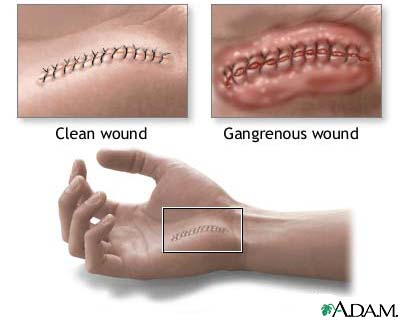Medical importance
C. perfringens has many toxins which are described in the section entitled "Toxin". these various toxins are actually what can cause some of the illnesses associated with this bacterium. Yet other issues can be caused just because the bacteria doesn't belong in that area.
Typically this bacterium will cause food poisoning in patients
who's meat products have not been properly cooked. The food
poisoning caused develops with watery diarrhea and abdominal
cramps (6-24 hours) post ingestion of food. On the positive side
food poisoning only last 24 hours.
To prevent food poisoning the
CDC recommends that foods such as
beef, poultry, gravies and other foods should be cooked
thoroughly with an internal temperature reaching 145-165°F
or 63-74°C.
Another problem that this bacterium can cause is gas gangrene
and necrotizing fasciitis.
Gas gangrene is created when C. perfringens is living
under the skin of a patient and is growing rapidly. As the cells
grow they release gasses through respiration which in turn will
start to swell the skin. This swelling of the skin is extremely
painful and when pressed on will give a crackling sensation as the
gas moves around under the skin. There are numerous other
symptoms to gas gangrene that
medlineplus has listed
and all of these symptoms occur suddenly and rapidly worsen.
Necrotizing fasciitis, is a rapid infection of the fascia and
subcutaneous tissue layers causing a death of the cells
located
there. This issue can be a secondary issue if gas
gangrene is not
corrected properly and quickly. The tissues
around the area of
infection will start to die and the toxins
that are then
associated with it will also spread rapidly causing
a rapid
death of tissue. This could lead to a possible amputation
of an
extremity if the problem isn't properly taken care of early.
